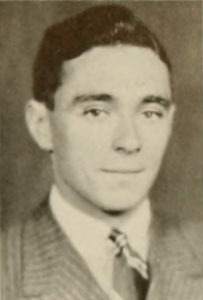One of my interests in writing my yet-to-be published book, The French Desk – A Brooklyn Gal’s Journey into Wartime Propaganda, has been to tell the story of my mother’s life experiences before she was married. During WWII, she worked for the Office of War Information from October, 1942 – August, 1945. I always felt the propaganda work she was involved with had a very interesting side, and one that I did not read about or see portrayed in books and movies all that much.
My other idea was to present the story from someone who was not way up, or even up, in the chain of command. As a Katherine Gibbs trained executive secretary, who happened to be a college graduate with a year of study abroad and fluency in French for good measure, my mother was qualified for more than secretarial work which is exactly what happened.

Still only in her mid-twenties, she was moved from Clerk-Stenographer upon hiring to Junior Research Analyst to Junior Field Rep to Assistant Field Rep to Chief of the Speakers Bureau at the USIS in Paris within a two-year time frame.
After reading all the letters, I thought her personal experiences were interesting enough. Really, a book could be written about all that. But I liked the angle of the propaganda work and thought the combination would be a fun read. Little did I understand what I was taking on.
One of my earliest outreaches was to Dr. Jerome Bruner, an American Psychologist who had worked with my mother in Psychological Operations throughout her time on the OWI French Desk. Dr. Bruner was happy to answer my questions as he was still working at New York University at the time.
He remembered my mother well and was glad to hear from me. This was back in 2010, before I started writing the fictionalized account. At 97 years of age, his mind was still sharp. He told me she had nothing to do with spy work, which was the big rumor in association with her information / intelligence work. “We never got involved with any of that stuff,” Mr. Bruner responded. Interestingly, after serving in the OWI, Dr. Bruner returned to Harvard (where he received his PhD) to teach, and ultimately went on to publish many books in the area of cognitive psychology and educational psychology.
Another connection was made through the children’s book author, Brian Floca, whom I met when he visited an elementary school library where I worked back in 2015. I mentioned to him that one of my mother’s closest friends was Margaret McElderry, a well-known children’s book editor and publisher and that I happened to be working up a fictionalized account of their joint experience working for the Office Of War Information during World War Two.
Luckily, and not surprisingly, Mr. Floca had known Ms. McElderry and suggested I reach out to Susan Cooper, an author and friend of Ms. McElderry, whom he thought might have some additional insight into areas where I wasn’t quite sure what had happened back in the day. It was Ms. Cooper who sent me the newspaper article describing the convoy in 1944, which would have been hard to dig out. I am so grateful to both Mr. Floca and Ms. Cooper for their kindness in helping me.
I also reached out to Dr. Holly Cowan Shulman, daughter of Louis G. Cowan, who had been head of the Radio Program Bureau and then Chief of the New York Office of the OWI during the time my mother worked there. Dr. Cowan has written an in-depth analysis of the VOA, ABSIE and the French Desk in her book, The Voice of America – Propaganda and Democracy, 1941-1945. It provided much needed insight to the French Desk at OWI, a crucial part of the story. I will always be grateful for her email support and also, the scholarship of the aforementioned book.
The numerous books, articles, videos and internet resources were so illuminating that I had a hard time not including more of the research. There’s so much analysis, on both sides of the political aisle, as to what the OWI did or didn’t do that it felt overwhelming. The road OWI traveled was a bumpy one, often filled with potholes. The best thing to do was to just carry on and do the work, and everything else will fall into place.
On top of all that, there were more experiences my mother had, and much more work material, than I ever could possibly include. The book is content-heavy as it is. It’s fun to have a surfeit of options on which threads to pursue.
